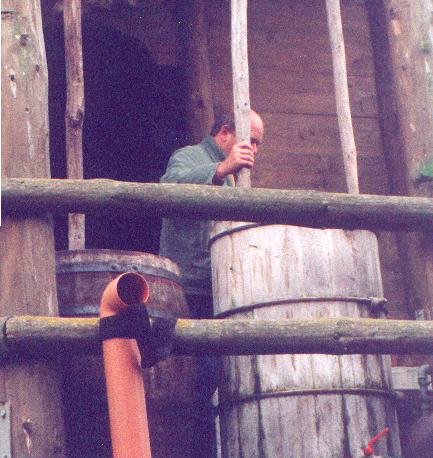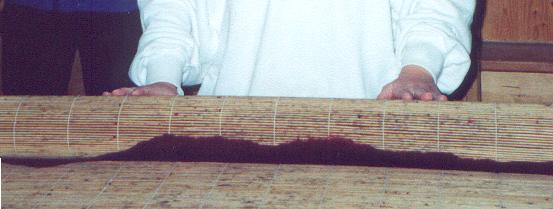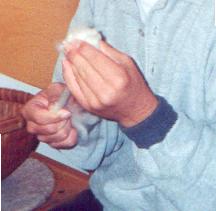
In 1978 the first mentally handicapped people came to Hohenberg, and the farm was outfitted with new homes and workshops. All of the work at Hohenberg still follows the rhythm of the seasons. Community life and work are integrated by several important ideas: that men, earth, plants, and animals can develop together in harmony, and that there should always be a balance between activity and rest, work, and more typical therapy. All of the crops at Hohenberg are grown in rotation, using a compost as fertilizer, and animals are allowed to graze freely. The community supplies its own food through working the land.
In all areas of food production and work at Hohenberg, the tasks are adapted to the abilities and understanding of the community members. There is a wide variety of work to be done, from growing corn to making bread, planting seeds to carving wooden bowls. By selling the items they produce, the Hohenberg community members have also forged a connection to the outside world. They have a sense of pride in the goods that they produce, and all of the proceeds go back into supporting the farm.
All of the produce at Hohenberg is grown organically - a process monitored by the Demeter company. There are a total of 46 hectares of land cultivated - with cows, cattle, pigs, sheep and horses. Two of thehorses are used as part of the community member's therapy, while the others help with cultivation and pulling carriages with visitors. All of the animal's food comes fromthe farm, and in turn, the livestock ass to the production. Cow's milk is made into cheese, and meat is sold at the market.
In the bakery, bread, cookies, and other goods are made. The flour is ground using a traditional sstone gristmill, and even the butter is made on the farm (see picture below)

The vegetable garden (on four hectares of land) is cultivated according to the same sustainable farming practices mentioned above. Spinach, leafy vegetables and root vegetables are grown along with corn, cucumbers, herbs and rhubarb. The garden changes with the seasons, having more large vegetables in the summer and salad greens in the winter. Also, the farm has a small orchard with a variety of fruits.
This workshop uses traditional methods to produce a variety of milk products: yogurt, butter, buttermilk, cheese, and regular milk for drinking.
This shop specializes in producing several 100% linen and wool textiles. Once the cloth is made, it is turned into children's clothing and other tailored items. As seen below, the wool, once picked through and spun, is flattened into sheets of fabric to be sewn together.


In this building, community members produce traditional yarn and wool items (as seen above). The wool is washed, carded, spun and colored with plant dyes. Then, it is woven on a loom and knitted. Final products include vests, jackets, and shirts. All items can be custom made in any size and color.
In the woodshop, the workers will use a variety of different wood types to produce hand-made products. Ash, alder, oak and apple wood are carved and then finished with a varnish. Miniature houses, gnomes and other carved figures are produced.

candles are made from 100% beeswax, collected from hives near Hohenberg. Birthday candles, christmas candles, and Advent candles are made in the appropriate season. During the summer, this workshop also produces greeting cards and gift wrap.